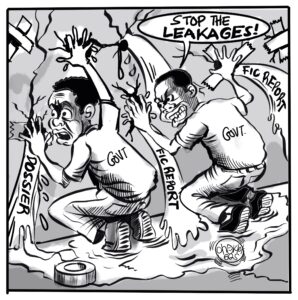Attorney General Likando Kalaluka says fighting financial crimes is not an easy undertaking and he sometimes instructs law enforcement agencies to drop certain cases to avoid getting the state sued for compensation.
“For instance, as Attorney General, I can mention here that on a weekly basis, I receive maybe 45 cases where the Drug Enforcement Commission have frozen an account and it is now a year, and most lawyers are writing to say ‘why have you frozen our client’s account for a year?’ And they are pushing, they are suing, I end up engaging the DPP to find out what’s happening and she says ‘we are still doing investigations’,” said State Counsel Kalaluka.
“So sometimes when I engage with the DPP, with the DG, Anti Corruption, with the commissioner of the Drug Enforcement Commission to discuss individual cases, on why we are delaying, sometimes, we get to an extent where we say ‘to avoid being sued, let’s leave it’.”
This may appear to be a wise move, but unfortunately, it also announces the interference that law enforcement agencies face from other authorities. The danger with this is that it is difficult to know whether the Attorney General is afraid of causing the government to lose money from compensation or his office has the fear of preventing illicit money from going into people’s pockets – pockets of powerful people who have great influence on the State.
The office of the Attorney General should not be seen to interfere with the operations of the Drug Enforcement Commission or Anti Corruption Commission. This admission by State Counsel Kalaluka makes us understand why cases of public interest disappear in thin air. It explains why powerful criminals don’t get to be tried in court. It appears that the Attorney General takes the role of an investigator and judge who can decide whether a case should be dropped or not.
So this means even the effort we are seeing by the Anti Corruption Commission to redeem itself from the lost public confidence are stage-managed. Now we know that the high profile cases involving top government officials that the Commission is pursuing may not yield any convictions, because investigators are being told what to do by someone who is not involved in the investigations. This is really sad.
What the Attorney General said also explains why the Anti Corruption Commission seems to be avoiding actual corruption charges on some government officials and it is instead using the Proceeds of Crime Act, because the Anti Corruption Act is laced with complications.
Some people may not be happy to see that those who are being arrested don’t seem to be charged appropriately, but we feel there is a valid reason why this is so. The current procedure is such that, if the ACC is to charge anyone under the Anti Corruption Act, they will have to get consent from the Director of Public Prosecutions, which is another office known for interference.
Under normal circumstances, the office of DPP should inspire confidence. People should know that when the DPP gets involved, then the case is very serious and someone is going down. But this is not what we are seeing. What is happening is the opposite. Once the Director of Public Prosecutions applies to be joined to a high profile prosecution, just know that something fishy is cooking. This is an office which is so compromised that, due to political influence, it can submit recommendations which appear contrary to the interest of the State.
So, the ACC’s crafting of charges against high profile government officials now makes sense. It seems this is what they are avoiding. It’s like the Anti Corruption Commission is trying to circumvent unnecessary procedural challenges. Again, we must say, this is sad.
If the Anti Corruption Commission was allowed to operate freely and to use all the laws at its disposal, we would not be seeing government individuals being singled out of a corruption syndicate which includes many others. We would be able to see law firms involved in money laundering being pursued, contractors and even banks. But that is difficult to prove under the Proceeds of Crime Act.
So, we can insult as much as we want and call the Commission all sorts of names, but as we do, we must be mindful of the fact that the institution has far reaching operational challenges than money can solve. It is only in order that gratitude is shown where efforts are made.
Whoever is in charge of operations at ACC is an employee who must be commended and saluted for at least coming up with tactical methods of circumventing external controls, which may hamper the course of justice. We have heard the challenges you face from the Attorney General and we can only hope that your efforts will cage even a few criminals.
























